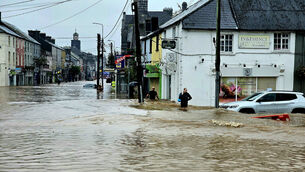UCC study finds most victims of stalking know perpetrator

Inappropriate texts, WhatsApps, or emails were the most common forms of malicious communications identified by respondents. Photo: Dominic Lipinski/PA Wire
A University College Cork (UCC) report, the first Irish study of people stalked and/or harassed, has revealed the social, financial and psychological impact upon those who have experienced stalking and harassment.
The report, undertaken by Catherine O’Sullivan and Ciara Staunton in partnership with the Sexual Violence Centre Cork, shows that in the majority of cases perpetrators of stalking or harassment were known to them.
“The main objective of the study was to focus on the process of stalking and harassment, the effects on those who have been stalked and harassed and their responses to these behaviours,” said Ms O’Sullivan.
Over 1,000 participants responded to the survey and the research was prompted by the bravery of Una Ring and Eve McDowell, who spoke out about their experiences of stalking and who advocated for the introduction of a new stalking offence in addition to the existing harassment offence in Ireland.
“Our findings identify a range of avoidance behaviours used by victims to protect themselves and reveals the social, financial, physical, and psychological consequences of stalking and harassment,” said Ms Staunton.
The report — Stalking and Harassment: An Investigation of Experiences in Ireland — found that perpetrators identified by the victims were mostly known to them.
There were 367 reports of the perpetrator threatening to harm themselves around the respondent. Having pictures or recordings taken without consent was mentioned 270 times with 170 reports of private images of a very personal nature being shared.
44% of respondents indicated that the perpetrators threatened to harm them or those close to them, directly or indirectly.
Inappropriate texts, WhatsApps, or emails were the most common forms of malicious communications identified by respondents. Being the target of inappropriate or malicious social media contacts was the second highest form of reputational damage.
In terms of social impacts, changing routes from home or school and giving up social activities were the most commonly mentioned and long-term psychological distress was apparent.
42% of respondents reported the incidents to An Garda Síochána. Over half did not.
The report makes 10 recommendations, including the need for an information campaign on stalking, improvements in garda training, and changes to the proposed wording of stalking offences.










 App?
App?


